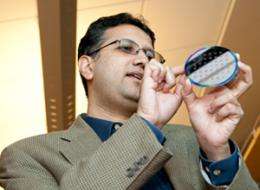Shuvo Roy, PhD
UCSF researchers have designed a model filtration system that could offer a new approach to treating patients suffering from end-stage renal disease, potentially removing the need for a clinic-based dialysis process altogether.
Initial results of the research were presented as an abstract on June 10 by UCSF nanoengineer Shuvo Roy, PhD, during the annual conference of the American Society for Artificial Internal Organs in Washington, DC. Roy also presented initial results of tests showing that silicon-based membranes are compatible with human blood and thus offer viable options as filters in implanted devices such as the team’s model for an implantable artificial kidney.
The filtration model is designed as a trap for mid-sized molecules that need to be filtered from the patient’s blood stream, with the upstream filter sized to leave large molecules such as proteins and blood cells in the blood, and the downstream filter sized to block urea and creatinine while allowing electrolytes and nutrients to return to the blood stream.
Ultimately, researchers say the system could provide an intermediary therapy for dialysis patients awaiting a kidney transplant, thus untethering them from tri-weekly visits to dialysis centers. It also could be used in an interim device in developing an implantable bio-artificial kidney, in which cell therapy would augment the function of the downstream filter to replace most of the functions of a real kidney.
Abstracts are published in the March/April issue of the ASAIO journal.
Provided by University of California, San Francisco


















